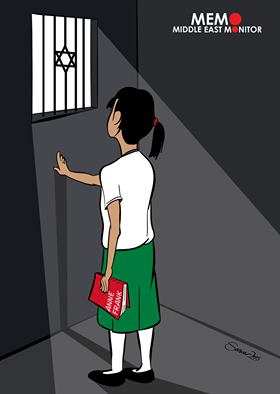RAMALLAH, January 28, 2015 (WAFA) – In a different world where Israeli occupation doesn’t exist, a 14-year-old girl would have been busy complaining about her coursework, going out with her friends to the mall, watching television with her family over a neatly prepared dinner table or simply staring at the night sky dreaming endlessly about the bright future.
Unfortunately that is not the case for Malak al-Khatib. She was literally snatched from the side walk next to her school in the small village of Beitin, in the Ramallah district by heavily armed Israeli soldiers, who claimed to have been spooked by Malak’s threatening actions and alleged stone throwing. Malak was eventually locked up behind bars in Israel after a trial at Ofer Military court on January 22.
Malak, the youngest Palestinian prisoner currently serving an actual imprisonment sentence in Hasharon Israeli prison for two months, is sleeping far away from her older four brothers and three sisters. Being the youngest in her family, Malak has left quite a gap that couldn’t be filled, but with fear and unease.
Malak’s father Ali told WAFA that until the moment he knows nothing about his young daughter, who has been detained for about 23 days since December 31, and later sentenced to two months in prison and a fine of 6000 shekels (approx. $1523).
“We do not know if she is feeling cold or hungry or what she is going through,” said Ali in a noticeably desperate tone. He confirmed that his family was not yet granted permission to visit Malak; however he said he would hear back from the Red Cross on possible visitation permission next Sunday.
Ali said that lawyer Taghreed Jahshan from Women’s Organization for Political Prisoners, has visited Malak and informed the family that Malak has flue and feeling slightly tired. However, other older female prisoners are taking care of the child and providing her with constant care and support.
Malak’s 20-year-old sister Wa’d, described her young sister’s arrest and following sentence as an “unforeseen shock”, especially that Malak is a quiet girl who has never expressed any violent tendencies or done anything such as throwing stone.
“We are used to Malak being the fun one. She is always laughing and we are used to her being so lively in the house,” Wa’d said. “We are in distress. We can’t sit or do anything since Malak’s arrest and detention.”
The family tried to send Malak cloths to keep her warm during the cold season, because she was not prepared for two months away from home. She did not have many items with her upon her arrest, thinking that she will be leaving in maximum two weeks. Her mother requested that some cloths be sent to Malak, but her request was denied by the judge.
Lawyer Jahshan who doesn’t represent Malak, yet has visited her in prison and sat with her for half an hour, told WAFA that Malak is impatiently waiting to go home. “We are talking about a child here. She is looking forward to go home to her family.”

Locked behind Israeli bars for two months, Malak was accused to throwing rocks and the possession of a knife.
Jahshan said that Malak is expected to be released on February 13, however her release is not confirmed as it might be just what is called as an “administrative release”, meaning that she might remain in prison even after the official date of her release.
The lawyer said that she and her colleagues will continue to monitor the case of Malak and remain in touch with her family and the prison’s administration in order to coordinate Malak’s release and inform her family of the latest updates.
Jahshan said that Malak is now under the careful attention of other older female prisoners. “Malak didn’t have any cloths, but prisoner Muna Qadan has asked her family to bring cloths that fit Malak. The older prisoners are taking care of the younger ones and are making sure to provide them with food and emotional support.”
If Malak wasn’t arrested on the last day of her first school term, she would have been back at school now, flipping through her new colorful books and enjoying the break time with her young girlfriends. Malak’s sister Wa’d said that when Malak is released, life will definitely return to its normal path and her family will be able to resume living from where Malak has left.


